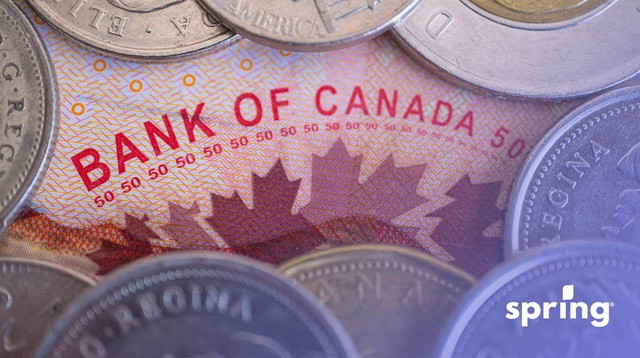Just because you’re young, though, doesn’t mean that you have bad credit. That said, in general, the older you are, the higher your credit score. This doesn’t mean that the difference is large or that you don’t have an excellent score; it just means that the more credit history you have, the more likely you are to have a higher credit score.
Breakdown of Credit Scores By Age
The average Canadian credit score is around 680, which is considered to be a good credit score. That said, this number changes a bit when we break down this average by age. Interestingly enough, though, all of the average credit scores in Canada by age aren’t below average credit scores, they’re actually higher than the Canadian average.
Ages 18-25
Those who are between the ages of 18 and 25 are fairly new to credit in Canada. You can only start building your credit score with consumer loans and car loans at age 18. For this reason, your credit history is likely to be a bit shorter. However, you are still able to build credit to a decent credit score. The average credit score for this age group is currently 692, which is a pretty decent score.
Ages 26-35
Those between the ages of 26 and 35 are likely to have higher credit scores because they have a bit more credit history. That said, the average credit score is only a few points higher than those in the younger age group. The average score is 697.
Ages 36-45
Due to the fact that this is the age at which many Canadians purchase their first home and start a family, the average credit score at this age is considered a high credit score. This is because a credit score of 680 or higher was needed to purchase your first home (now 600 is required), and many new parents want to put themselves in a financially stable situation with healthy financial habits before they start expanding their family. The average score is 710.
Ages 46-55
Generally speaking, those between the ages of 46 and 55 likely have a large credit history with a good credit mix on their credit profile. They’ve also had time to build a good payment history and correct any slip-ups they may have had with their credit score as their long credit history grows. We see this in the fact that the average credit score for this age group is 718.
Ages 56-65
Those between the ages of 56 and 65 have one of the highest credit score averages, which is 737. As we mentioned before, those in this age group are able to use their age as an advantage. Time can correct any negative effects on your credit score. In fact, in 7 years, collections can drop off your credit score completely.
Ages 65 plus
Based on the trend we’re seeing where the average credit score increases with age, it’s no surprise that those with the highest credit score are those in the 65-plus age group. Their average credit score is 750, which is considered to be a very good credit score. Even though their income is likely lower because they’ve reached retirement age, they have built up their credit score well over time and have balanced out their credit report.
Factors That Affect Your Credit Score
While age is a large factor in what your credit score is, it isn’t the only factor. In fact, credit bureaus use information from your credit report in order to come up with the three-digit number that is your credit score. Keep in mind, though, that each credit bureau’s credit score will be a little different, meaning that you’ll have both an Equifax credit score and a Transunion credit score. Here are the factors for one of the different credit scoring models that affect how your credit scores are calculated.
Credit Utilization
Your credit utilization ratio accounts for roughly 30% of your credit score. This is how much of your revolving credit limit you use in comparison to your total credit limit. In order to get the most positive effect on your credit score, you should keep your credit utilization low at 30% or lower. The higher your credit utilization, the more it will negatively affect your score.
Length of Credit History
The length of your credit history makes up 15% of your credit score. The longer you have a credit line, the better it looks on your credit report. For this reason, it’s also important to have a good credit mix and to have a limited number of cancelled credit lines. How much credit you have makes a difference in your score; ideally, the more credit you have, the better.
Payment History
Your payment history makes up 35% of your credit score. While the odd missed payment may not affect your credit score too much, having a multiple number of late or missed payments on your credit report bodes negatively for your overall credit score.
Public Records
Public records are another part of your credit score. They make up for around 10% of your credit score. Public records include credit products that are in collections, consumer proposals, any bankruptcies, lawsuits or anything else that can hurt your score.
Credit Applications
The factor that makes up the last 10% of your credit score is credit inquiries. While soft credit checks don’t make a difference to your credit score, every hard credit check can reduce your credit score by 5 to 15 points. For this reason, it’s recommended that you have less than 6 credit checks done per year.
Credit Score Model
In Canada, credit scores range from 300 to 900, with 300 being the lowest score and 900 being the highest credit score. Your score will be based on the range from Poor to Excellent. Let’s take a look.
| Category | Credit Score Range |
| Poor Credit Score | 300 – 559 |
| Fair Credit Score | 560 – 659 |
| Good Credit Score | 660 – 724 |
| Very Good Credit Score | 725 – 759 |
| Excellent Credit Score | 760 – 900 |
Keeping Track Of Your Credit Score
Before you start applying for credit accounts, it’s a good idea to know where your credit score falls and keep track of your financial health. In Canada, there are many ways that you can do this that won’t cost you anything. Here are a few ways to do so.
Online Credit Checking Sites
One of the most common ways to check your credit score is through online credit reporting sites such as Credit Karma, Borrowell, and Clear Score. Each of these credit score companies provides a safe and accurate representation of your free credit score while giving helpful credit advice. That said, they only work with one credit bureau, so you may need to sign up for more than one site to get both your Equifax Canada and Transunion credit scores since different financial institutions will report to different credit bureaus,
Credit Bureaus
Another way to check your credit score is through the credit bureaus. Both Transunion and Equifax offer credit check services just like the online credit sites above. With the credit bureaus, you can also do a hard credit check for free once per year. This hard credit check doesn’t just show you your credit score; it gives you a full rundown of your credit report and full credit history.
Online Banking
Depending on who you bank with, you may be able to keep an eye on your credit score directly through your online banking. Depending on who you bank with, it may be your Equifax or Transunion credit score that you can keep track of. It’s a good idea to track both, but you may have to find an alternative method to find your second credit score.
How To Improve Your Credit Score
No matter your age, it’s never too late to improve your credit score. You can do this by improving any or all of the 5 categories that make up your credit score. This is the general credit scoring model used in Canada. Here are a few ways you can do this.
Credit Utilization
One of the most common reasons your credit score suffers is that your credit utilization is higher than 30%. While paying down your revolving credit lines is one way to increase your credit score, it isn’t the only way. Another way to do this is by increasing the overall credit limit. As long as you don’t spend any more money, this lowers your utilization and increases your score.
New Positive Credit Lines
If having negative credit lines is bringing down your credit score, the easiest way to combat this is by adding new positive credit lines. While this can be difficult due to your low credit score, taking advantage of secured loans and credit cards could be beneficial for you. Most of these products are guaranteed approval and can be converted into traditional credit lines when you prove to the lender that you can make your payments on time.
Positive Payment History
If you have a lot of missed payments on your credit report, making your payments on time can slowly negate these missed payments. The more positive payments you can show on your credit report, the higher your credit score. This will also show lenders you’re financially responsible, allowing you to add more positive credit lines to your report.
Reasons Credit is Important
Not only does having a good credit score help you get lower interest rates on financial products such as personal loans, it can make a difference when it comes to renting and even getting a job. Landlords and employers look for those who show responsible credit use when making their final decisions.
If you make poor decisions in your personal finance situation, it can make them uneasy about choosing you. Having too much debt or being unable to repay debt can make lenders think you’ll be unable to pay your rent.
Final Thoughts
In Canada, credit scores are an important part of your day-to-day life. While your age can play a part in your credit score, it isn’t the only factor to consider. By demonstrating financial responsibility when it comes to your credit accounts, you can improve or maintain your credit score while still obtaining new financial opportunities.
While studies have shown that age shows an increase in the average credit score, that doesn’t mean that you can’t have a good credit score in your 20s or 30s. It just means that the more time you spend working on your credit score, the more likely you are to keep it in the very good to excellent range.









